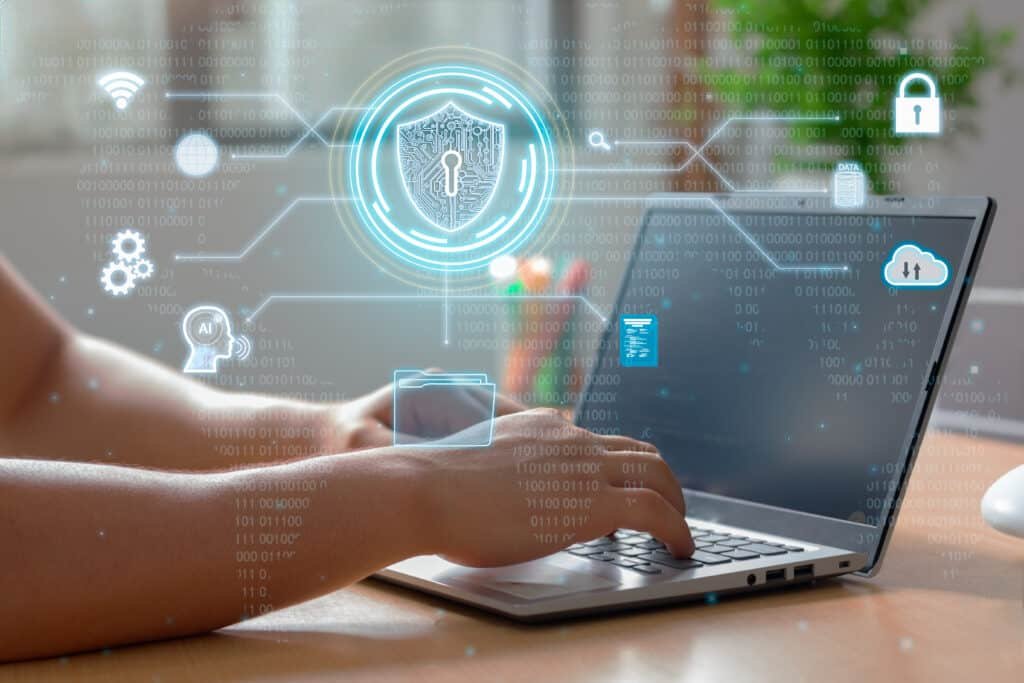Is Online Banking Safe? A Complete Guide to Banking Security in 2023

We may earn a small fee from the companies mentioned in this post.
In today’s digital world, online banking has become an essential tool for managing finances. But with the fear of cyber threats and online scammers, is online banking really safe? The answer lies in understanding the key factors that contribute to secure online banking and taking necessary precautions.
In this article, we’ll explore the essentials of “is online banking safe”, mobile banking security, and how to avoid common scams that could put your hard-earned money at risk.
Short Summary
Online banking security is achieved through encryption, data protection and government backed insurance.
Secure your online banking experience with strong passwords, multi-factor authentication and trusted apps/websites.
Select the right online bank by considering security features, customer service and product offerings.
- Ensuring your smart device (phone or table) or Laptop/computer is secure
Understanding Online Banking Safety

Online banking safety revolves around three main components: encryption, data protection, and banking insurance. Encryption is the process of encoding data so that only authorised users can access it, ensuring the confidentiality of your online banking transactions.
Data protection methods are employed by banks to keep your personal information secure and out of the hands of cybercriminals. Lastly, banking insurance, such as the Financial Services Compensation Scheme provides a safety net for your deposits, giving you peace of mind that your money is protected.
Checkout our informative article on the Immediate Connect Scam
Encryption and Data Protection
Online banks use advanced encryption and data protection methods to safeguard customer information. Encryption technologies such as Secure Socket Layer (SSL) and Transport Layer Security (TLS) ensure that data transmitted between your computer and the bank’s server is secure and unreadable by unauthorised parties.
Additionally, online banks implement privacy policies and robust security measures, including firewalls and intrusion detection systems, to protect your data from potential security threats and breaches.
Financial Services Compensation Scheme (FSCS).
The FSCS is an independent fund set up by the UK government to provide compensation to customers if a financial services firm fails or is unable to meet its obligations. It covers deposits, insurance policies, insurance brokering, investments, mortgages, and pensions.
For deposits, the FSCS protects up to £85,000 per individual, per financial institution. This provides a safety net for consumers, ensuring that their money is protected in the event of a bank, building society failure.
You can find more information about the FSCS on their official website: www.fscs.org.uk.
Enhancing Your Online Banking Security

To further bolster your online banking security, it’s essential to take proactive measures such as using strong passwords, enabling multi-factor authentication, and trusting only verified apps and websites.
These steps can significantly reduce the risk of unauthorised access to your account and help ensure a secure online banking experience.
Strong Passwords
Creating strong, unique passwords for your online banking accounts is crucial to keeping your financial information secure. A strong password should include a mix of upper and lowercase letters, numbers, and symbols, making it difficult for hackers to guess.
Additionally, avoid using the same password for multiple accounts and update your passwords regularly. To help manage and store your passwords securely, consider using a reputable password manager.
We have written an informative guide on how to create a strong password
Multi-Factor Authentication
Multi-factor authentication (MFA) adds an extra layer of security to your online banking accounts by requiring two or more forms of verification to confirm your identity. This may include a combination of:
1. Something You Know
This is usually a password or PIN. It’s something that only you should know and is the first line of defense.
2. Something You Have
This could be a physical device like a smartphone, smart card, or a token. Often, you might receive a text message or an app notification with a unique code that you must enter.
3. Something You Are
This involves biometrics, such as fingerprints, facial recognition, or voice recognition. It’s something unique to your physical being.
By enabling MFA, you make it substantially more difficult for cybercriminals to gain unauthorised access to your accounts. This added layer of security can help protect your financial information and give you peace of mind.
You may find our easy to read article on Two-Factor security useful
Trusted Apps and Websites
It’s essential to use trusted apps and websites when accessing your online banking. To ensure you’re using a verified app, download it directly from your bank’s website or a trusted source like the App Store or Google Play.
When visiting a bank’s website, look for the padlock symbol in the address bar, which indicates a secure connection. By using a secure internet connection and trusted apps and websites, you can minimise the risk of falling victim to phishing or other online scams.
Mobile Banking: Is It Safe?

Mobile banking is increasingly popular due to its convenience and ease of use. But is it safe? The answer lies in the security features built into mobile banking apps and the precautions taken by users. By combining robust app security with user vigilance, mobile banking can indeed be a safe and secure way to manage your finances on the go.
Mobile banking apps are designed with security in mind. They use encryption to protect data.
Security Features in Mobile Banking Apps
Mobile banking apps come equipped with various security features to protect your financial and personal details. These include end-to-end encryption, biometrics (such as fingerprint or facial recognition), and instant alerts for unusual account activity.
These security measures work together to create a secure environment for mobile banking, helping to prevent unauthorised access and protect your accounts from potential threats.
Precautions for Mobile Banking Users
In addition to the security features of mobile banking apps, it’s essential for users to take precautions to ensure a safe mobile banking experience. Avoid using public Wi-Fi networks when accessing your online banking, as these networks are often unsecured and vulnerable to cyber-attacks. Instead, use a secure home Wi-Fi connection or a virtual private network (VPN).
Additionally, enable multi-factor authentication on your banking app and use strong, unique passwords to further safeguard your account.
Checkout our informative article on Royal Mail scams
Ensure the device you use to access your online banking application is secure
The device you use to access your online banking application plays a crucial role in the overall security of your financial information. Whether it’s a computer, tablet, or smartphone, taking the necessary precautions to secure your device can prevent unauthorised access to your accounts. Here’s how you can ensure your device is secure:
Keep Your Operating System and Software Updated
Regularly updating your device’s operating system and applicaiton software ensures that you have the latest security patches installed on the device.
Hackers often exploit known vulnerabilities in outdated systems (the software your device uses to operate), so keeping everything up to date is essential.
Replace Your Smart Device or Computer if It’s Too Old to Be Updated or Patched
In the ever-evolving world of technology, devices can quickly become outdated, leaving them vulnerable to security threats. If your smart device or computer is too old to receive necessary updates or patches, it may be time to consider a replacement.
Operating systems and software that are no longer supported by manufacturers lack the essential security measures to fend off modern cyber threats. Without these updates, your device becomes an easy target for hackers, potentially compromising sensitive information such as online banking details.
Investing in a new smart device or computer that supports the latest security enhancements is not just a matter of convenience; it’s a vital step in safeguarding your financial and personal data.
Remember, the cost of a new device is often a small price to pay compared to the potential loss and stress caused by a security breach.
Avoid Using Free Wi-Fi Networks When Using Online Banking Apps
Free and open Wi-Fi networks, commonly found in public places like airports, coffee shops, and hotels, can be incredibly convenient for browsing the internet on the go.
However, when it comes to accessing sensitive information such as your online banking apps, using these networks can pose significant risks. Here’s why you should avoid using free Wi-Fi for online banking and what you can do instead:
1. Lack of Security
Free Wi-Fi networks often have minimal security measures in place. Unlike private, password-protected networks, they are easily accessible to anyone, including potential cybercriminals. This lack of security makes it easier for hackers to intercept the data transmitted over the network.
2. Risk of Data Interception
When you use a free Wi-Fi network to access your online banking app, the information you send and receive can be intercepted by malicious actors. This could include your login credentials, account numbers, and other personal information. Cybercriminals can use specialised software to eavesdrop on your connection and capture this data.
3. Potential for Fake Networks
Cybercriminals can set up rogue Wi-Fi networks with names similar to legitimate public Wi-Fi hotspots. Unsuspecting users may connect to these fake networks, giving hackers direct access to their devices and the information on them.
Never connect your smart phone, tablet, or laptop to free or open WiFi access points when accessing online banking services. Instead use your 4G or 5G data service on your smart device instead.
You may find our article on how to protect yourself from public open WiFi useful
Recognising and Avoiding Online Banking Scams

With the convenience of online banking comes the risk of scams designed to steal your personal and financial information. Recognising and avoiding these scams is crucial to maintaining your online banking security.
Two common types of online banking scams are phishing scams and malware threats.
Phishing Scams

Phishing scams are attempts by fraudsters to trick you into revealing your login information by masquerading as a trustworthy entity, such as your bank. These scams often take the form of deceptive emails, text messages, or phone calls.
To protect yourself from phishing scams, follow these steps:
Be cautious of any communication asking for personal information or urging you to click on unknown links.
If you suspect a phishing attempt, delete the message immediately.
Report the phishing attempt to your bank.
You may find our article on protecting yourself from Phishing scams useful
Malware and Hacking Threats
Malware and hacking threats are other common risks associated with online banking. Malware refers to malicious software designed to compromise your computer or steal your information, while hacking threats involve unauthorised access to your accounts or devices.
To defend against these threats, use antivirus software and ensure your network is secure.
Be cautious when clicking on links or opening attachments from untrusted sources, and delete any suspicious emails or messages immediately.
Benefits of Online Banking

Despite the potential risks, online banking offers numerous benefits that make it an attractive option for managing your finances. The convenience of accessing your bank accounts and performing transactions from anywhere, lower fees due to reduced overhead costs, and higher interest rates are just a few of the advantages of online banking.
Online banking, besides being convenient, also provides an online banking safe way to manage your finances. Banks use encryption technology to protect their customers.
Convenience
The convenience of online banking is one of its most significant benefits. With the ability to access online banking, you have:
24/7 access to your accounts
The ability to manage your finances
The ability to transfer funds
The ability to pay bills
The ability to make transactions from the comfort of your own home or on the go
No more waiting in line at the bank or rushing to make transactions during limited business hours.
Online banking gives you the freedom to take control of your finances and personal details at any time, and from anywhere with an internet connection. This makes it easier to stay on top of your finances.
Lower Fees
Online only banks often have lower fees compared to traditional banks, as they don’t have the overhead costs associated with maintaining physical branches. This means you can enjoy lower ATM (Cashpoint) withdrawal fees, overdraft fees, and account maintenance fees, saving you money in the long run.
The savings from reduced fees, especially when you transfer money, can add up over time, making online banking a more cost-effective option for managing your money.
Higher Interest Rates

Another benefit of online banking is the higher interest rates often offered on savings accounts and loans. Since online banks have lower overhead costs, they can pass these savings onto customers in the form of higher interest rates.
This means you can earn more on your savings and potentially pay less interest on loans, providing a better return on your money and helping you achieve your financial goals faster.
Choosing the Right Bank and Online App
Selecting the right bank with an App that works for you involves considering several factors, including security features, customer service, and product offerings. By carefully evaluating these aspects, you can find an online banking option that best suits your financial needs and goals. Lets explore these features in a little more detail.
Security features should be a top priority when choosing an online bank. Look for banks that offer secure banking.
Security Features
When evaluating an online bank, it’s essential to consider the security features they offer. Look for banks that provide encryption, multi-factor authentication, and FSCS insurance to ensure your financial information is protected.
Additionally, check for any security certifications or affiliations with reputable industry organisations, as this can indicate a commitment to maintaining high security standards.
Customer Service

Customer service is another important factor to consider when choosing an online bank. Prompt assistance and support are essential for addressing any issues or concerns that may arise. Make sure the financial institution offers multiple communication channels, such as phone, email, and live chat, to provide timely and efficient help when needed.
Don’t be afraid to test out their customer service before committing to an account, as this can give you a good indication of their responsiveness and professionalism.
Product Offerings
Finally, consider the product offerings of the online bank. Look for a range of products, such as checking and savings accounts, loans, and investment options, to ensure the institution meets your financial needs. Compare the features and benefits of each product to determine which one is the best fit for you.
By evaluating product offerings, you can find an online banking option that provides the right mix of services to help you achieve your financial goals.
Conclusion – Is online banking safe
In conclusion, by understanding the key elements of online banking and by following the guildines outlined within this article, online banking can be considered secure and safe to use.
Online banking offers numerous benefits, such as convenience, flexibility, availability, secure communication and encryption. However, it’s essential to be aware of potential security risks and take necessary precautions to protect your financial information.
Frequently Asked Questions
What are the risks of online banking?
Online banking comes with risks such as malware, phishing, credit card scams, fake apps, and more. Users must be careful to keep their information safe with strong passwords and password managers.
Should you trust online banking?
Online banking is generally safe, but taking precautionary measures such as using a strong password can help protect your finances. Trust online banking, but be sure to stay vigilant.
What is the safest way to bank online?
To stay safe when banking online, create strong and unique passwords, use two-factor authentication, avoid public Wi-Fi, sign up for banking alerts, be wary of phishing scams, and choose trustworthy financial apps.
How can I create a strong password for my online banking account?
Create a strong password by mixing upper and lowercase letters, numbers, and symbols, avoiding reuse, and updating regularly for the best security of your online banking account. This will help ensure that your account is secure and protected from potential hackers. Using two-factor authentication is also important, as it adds an extra layer of security. Additionally, it is best to avoid public Wi-Fi networks, as they are not secure.
What security features should I look for in a mobile banking app?
Choose an app with end-to-end encryption, biometric authentication and instant notifications for suspicious account activities for secure mobile banking. These features ensure that your banking information is kept safe and secure, and that you are alerted immediately if any suspicious activity is detected.
Useful external references
- Financial Conduct Authority (FCA) – www.fca.org.uk
- The FCA provides guidelines and regulations for financial services, including online banking, in the UK.
- The UK Finance Website – www.ukfinance.org.uk
- UK Finance represents nearly 300 of the leading firms providing finance, banking, and payments-related services in the UK.
- The National Cyber Security Centre (NCSC) – www.ncsc.gov.uk
- The NCSC provides expert guidance on cyber security, including online banking safety.
- Which? Consumer Rights – www.which.co.uk
- Which? offers consumer advice and reviews, including information on online banking safety and security features.
- The Money Advice Service – www.moneyadviceservice.org.uk
- This free and impartial service offers advice on money matters, including online banking safety.
With over three decades of experience in the heart of London’s financial sector, I have dedicated my career to the pursuit of robust cybersecurity practices and IT leadership. As a Certified Information Systems Security Professional (CISSP), Certified Information Security Manager (CISM), Certified Chief Information Security Officer (C|CISO), Certified Ethical Hacker (CEH), and Computer Hacking Forensic Investigator (CHFI), I bring a wealth of knowledge and expertise to the table.
My journey in the field of cybersecurity has not only been about personal growth but also about sharing my insights with others. As an international speaker, I have had the privilege of addressing audiences worldwide, discussing the importance of cybersecurity in today’s digital age. My passion for knowledge sharing extends to my work as an author and blogger, where I delve into the complexities of cybersecurity, offering practical advice and thought leadership.
In my role as a CISO and Head of IT, I have overseen the development and implementation of comprehensive information security and IT strategies. My focus has always been on creating resilient systems capable of withstanding the evolving landscape of cyber threats.
My Master’s degree in Cybersecurity has provided a solid academic foundation, which, when combined with my practical experience, allows me to approach cybersecurity from a holistic perspective.
I am always open to connecting with other professionals in the field, sharing knowledge, and exploring new opportunities. Let’s secure the digital world together.

